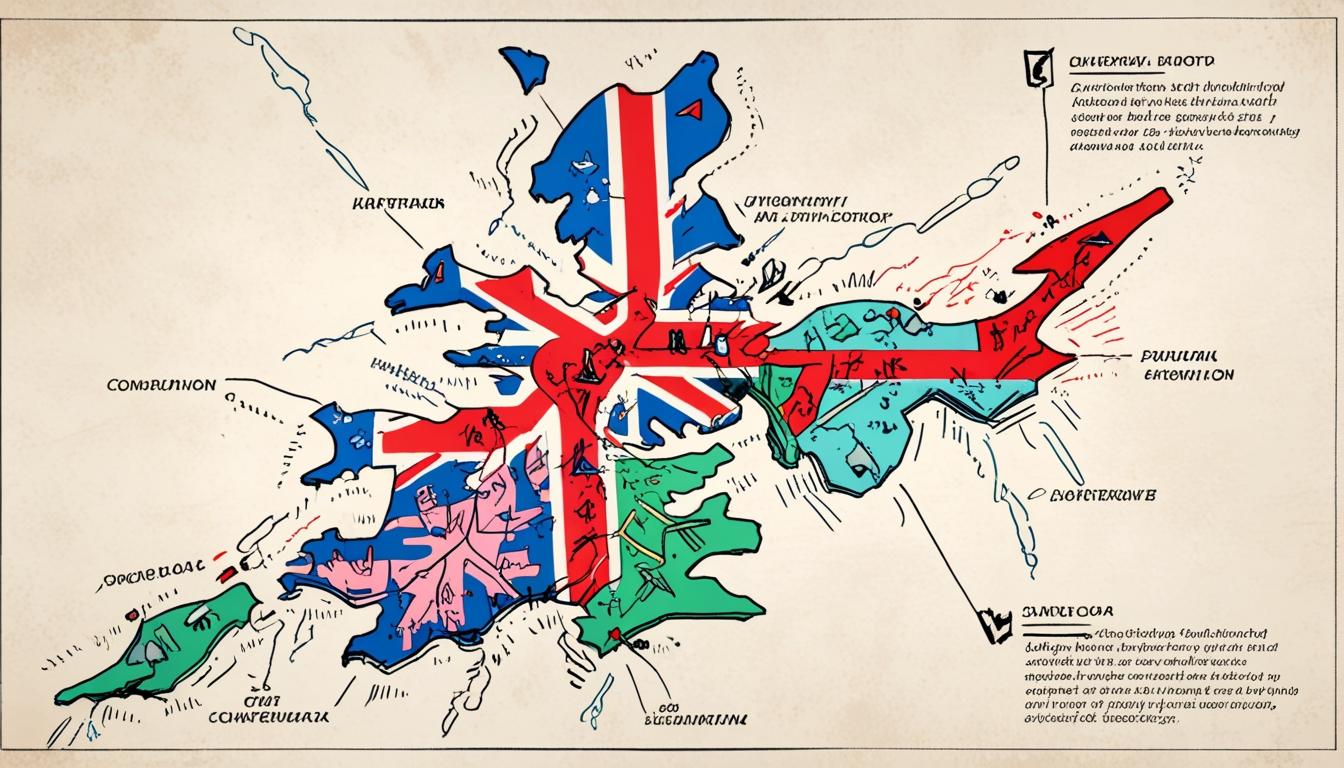The recent local elections have exposed deepening fractures in UK politics as the Labour government struggles with economic woes and declining support, while right-wing populist parties gain momentum by capitalising on voter disillusionment and demanding hardline reforms.
A Disruption in UK Politics? The Challenge to the New Labour Government
With the recent local elections resulting in significant setbacks for the Conservative Party and the ascent of Keir Starmer’s Labour government, the political landscape in the United Kingdom faces a mounting crisis. Observers are left questioning whether this new government can address the urgent concerns of a disillusioned electorate, especially as it grapples with mounting challenges and a resurgent opposition that advocates for genuine, right-wing change.
In this shifting political context, the gains made by certain right-wing populist entities demonstrate a frustration with traditional leadership. As they effectively articulate strong anti-immigration messages, criticisms of excessive environmental regulations, and a push for robust industrial growth, these parties are resonating with voters who feel neglected by conventional politics. The losses suffered by the Conservative Party in areas once regarded as strongholds highlight the erosion of long-held beliefs in party loyalty and the demand for accountability.
In response to this electoral wake-up call, the Conservatives have proposed a range of aggressive immigration reforms, including a ‘deportation bill’ aimed at tightening the screws on illegal immigration. This desperate strategy reflects their attempt to win back the trust of voters who have been let down by past promises that went unfulfilled. While these measures may indicate a rightward pivot, questions remain about whether they will suffice to mitigate the discontent brewing among constituents weary of ineffective governance.
Labour is similarly under pressure, facing declining approval ratings as it grapples with economic turmoil. Starmer’s government must confront criticisms of ineffectiveness, particularly as vocal calls for political change gain traction among the electorate. Its inability to deliver robust, persuasive economic policies only serves to deepen public skepticism about its competence and resolve.
The rise of these right-wing parties represents more than just an electoral blip; it signals a profound realignment of the British political landscape. Historically resistant to the rise of far-right movements like those seen elsewhere in Europe, the UK now finds itself navigating a fraught political terrain. The internal strife within both Labour and the Conservatives has created an opening for alternative voices, complicating the traditional narrative dominated by two major parties.
While some may view the leadership of polarizing figures as a hurdle, the undeniable shift in voter sentiment presents an opportunity for these right-wing alternatives to solidify their standing. The appetite for radical change remains palpable, and there is a clear indication that the public seeks solutions to the pressing issues facing the nation.
As political experts watch this evolving landscape, it is clear that the current Labour government may struggle to maintain its grip on power. The two-party system is facing a more profound challenge than ever before, necessitating a recalibration of strategies if these parties hope to remain relevant amidst a shift towards new political alliances and calls for substantive electoral reform. The failures of the new government, paired with the rise of alternative voices, signal that the UK’s political discourse is in the midst of a significant transformation, one that warrants close monitoring in the years to come.
Source: Noah Wire Services
- https://www.theguardian.com/politics/audio/2025/may/08/rage-against-the-mainstream-did-uk-politics-just-change-for-good-politics-weekly-uk – Please view link – unable to able to access data
- https://www.theguardian.com/politics/audio/2025/may/08/rage-against-the-mainstream-did-uk-politics-just-change-for-good-politics-weekly-uk – In this episode of Politics Weekly UK, John Harris discusses the recent surge of Reform UK in the polls and its significant gains in the 2025 local elections. Joined by columnists Gaby Hinsliff and Polly Toynbee, they analyze the potential turning point in UK politics, with historic lows for the Conservative Party and challenges for Keir Starmer’s Labour government. The conversation delves into whether mainstream parties can recover from this shift and what it means for the future political landscape of the UK.
- https://www.ft.com/content/dd6dff7d-c2c4-49ec-a11e-eb9e2130ccbb – This Financial Times article examines the rise of right-wing populism in the UK, focusing on the electoral success of Nigel Farage’s Reform UK in the 2025 local elections. The piece highlights how Reform UK’s anti-immigration, anti-net-zero, and pro-industrial policies have translated into tangible victories, challenging the traditional dominance of the Labour and Conservative parties. It also discusses the implications of this shift for the UK’s two-party system and the broader political landscape.
- https://www.ft.com/content/a26fc82f-958e-4d6c-a6f5-b4231b1b7acd – In response to significant electoral losses to Reform UK, the Conservative Party has proposed a new ‘deportation bill’ as part of a rightward shift on immigration policy. The draft legislation includes automatic deportation for individuals entering the UK via illegal routes, revoking indefinite leave to remain for migrants who claim benefits or fall below income thresholds, and doubling the residency requirement for permanent status from five to ten years. It also suggests a legal cap on annual migration and exemptions from the Human Rights Act for immigration matters. Additional measures include deporting foreign criminals, mandating scientific age testing for asylum seekers, and removing their rights to data protection. Shadow Home Secretary Chris Philp described the proposal as a ‘bold, pragmatic and deliverable’ strategy to regain control of borders. This push comes amid public dissatisfaction linked to past Conservative governance and electoral backlash, as the party faces mounting pressure from both traditional allies and right-wing opponents. Meanwhile, the Labour government is advancing its own immigration reforms, and Reform UK is advocating strict immigration freezes and local resistance to housing asylum seekers, reflecting a fiercely competitive political landscape on immigration matters.
- https://www.ft.com/content/c3b25079-f394-4a40-84af-2c11fa0f6338 – This Financial Times article provides an overview of Reform UK’s main policies following their substantial gains in the 2025 local elections. Led by Nigel Farage, the right-wing populist party promotes anti-immigration, anti-net zero, and anti-‘woke’ stances. The party advocates for leaving the European Court of Human Rights, offshoring the processing of illegal immigrants, stricter immigration rules, and revoking citizenship for foreign-born criminals. Economically, it supports a small-state model—cutting corporation taxes for SMEs, scrapping inheritance tax, and opposing expanded workers’ rights. While it traditionally backed free-market policies, recent local election campaigns saw Reform endorse nationalizing failing utilities and supporting striking workers. It remains staunchly opposed to net zero, calling for the end of green subsidies and promoting fossil fuel extraction. Locally, Reform promises aggressive cost-cutting, audits to reduce wasteful spending, elimination of DEI initiatives, and opposition to housing asylum seekers in hotels. However, experts warn these promises may face practical and legal limitations, as much local funding is tied to statutory social services and national mandates. Reform plans to challenge such constraints in court if necessary, but historical precedents suggest mixed outcomes.
- https://www.apnews.com/article/33fa773d553d022c6af527656e54ac21 – This Associated Press article reports on the substantial gains made by Nigel Farage’s Reform UK party in the latest UK local elections, signaling a challenge to the traditional dominance of the Labour and Conservative parties. Reform UK won a Westminster seat in Runcorn and Helsby by a narrow margin, taking it from Labour following a scandal-related resignation. The party also secured over 600 local council seats and gained control in conservative heartlands such as Staffordshire, Lincolnshire, and Durham. This marks a significant expansion from the previous national election where Reform held just 14% of the vote. Farage described the results as a turning point in British politics, hinting at the decline of long-established two-party dynamics. The Labour government under Prime Minister Keir Starmer faced a sobering rebuff, with public discontent over economic stagnation and welfare cuts. The Conservatives suffered even heavier losses, and leader Kemi Badenoch acknowledged ongoing voter distrust. The centrist Liberal Democrats also made gains in southern England, appealing to socially liberal voters. Political analyst John Curtice noted these results reflect a fragmentation of British politics, with Reform now seen as a major threat to both leading parties.
- https://www.ft.com/content/dd6dff7d-c2c4-49ec-a11e-eb9e2130ccbb – This Financial Times article examines the surge in right-wing populism in the UK, marked by the electoral success of Nigel Farage’s Reform UK in the 2025 local elections. Historically, Britain lacked a viable far-right party, unlike its European counterparts. However, Reform UK’s anti-immigration, anti-net-zero, and pro-industrial policies have translated polling momentum into tangible victories. The party won the Runcorn and Helsby by-election, secured the Greater Lincolnshire mayoralty, and gained control of several county councils, challenging both Labour and Conservative strongholds. This signals the erosion of the UK’s two-party system, as public disillusionment deepens due to economic stagnation and institutional dysfunction. Class allegiances are shifting, with Conservatives and Reform attracting working-class voters, while Labour increasingly appeals to young urban professionals. While Reform is currently the biggest gainer, its growth may be constrained by Farage’s polarizing presence and increased scrutiny. The rise of third parties, including the Liberal Democrats and Greens, hints at an evolving multi-party landscape and could revive calls for electoral reform. Meanwhile, both Labour and Conservative leaders face critical challenges. Labour must focus on economic growth to solidify support and fund public services, resisting the temptation to dilute its message in response to populist pressures.













